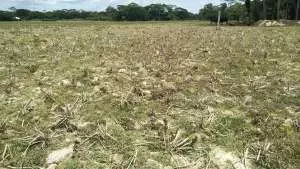Organic matter (OM) is the large pool of carbon-based compounds within natural as well as engineered terrestrial and aquatic environments. The soil organic matter (SOM) is composed of organic compounds that actually have come from the remains of different organisms such as plants and animals, substances synthesized by soil organisms as well as their waste products that are available in the soil environment. Sustainable land and vegetation management practices are essential for maintaining crop productivity while maintaining or enhancing organic matter in the soil [1]. Organic-matter content in soil is dependent on agro-climatic conditions and is difficult to conserve at a high level in tropical and subtropical conditions [2]. In general, the organic matter content of Bangladesh soils is low. Bhuiya (1987) reported the organic matter contents of 17 soil series, each from 17 general soil types of Bangladesh. According to him, Peat had the highest (35.37%) organic matter content followed by Acid basin clays (5.20%) and Acid sulfate soils (3.46%). But, these soils are not agriculturally important, as they have some constraints to crop production. Among the remaining 14 soil series, only 4 soil series had more than 2% organic matter while the other 10 soil series had below 2%. The overall organic matter content is usually low in the agriculturally important soils in Bangladesh [3].
A decline in soil organic matter causes by the reduced presence of decaying organisms or an increased rate of decay as a result of changes in natural and anthropogenic factors. The causes of organic matter decrease from Bangladesh soil are given below-
1. Higher rate of decomposition of soil organic matter:
The decomposition rate of organic matter is higher in Bangladesh due to the climatic parameters such as temperature, humidity, etc. The annual demand for the organic matter for agricultural lands is not at a perfect level in Bangladesh.
•Bangladesh is situated in a subtropical region where the temperature is really higher or 7-8 months out of 12 months. The higher temperature is suitable for the decomposition of organic matter.
•The dry and wet condition of the climate of our country is suitable for the rapid oxidation of organic matter.
•The pH value of Bangladesh soils is almost suitable for microorganisms. The rapid decomposition of organic matter can occur because of the activity of microorganisms.
2. Burning of natural vegetations and crop residues:
 Figure: Agricultural plot with crop residues. (Credit: Ashikur Rahman Ashik, SES, BU)
Figure: Agricultural plot with crop residues. (Credit: Ashikur Rahman Ashik, SES, BU)
The burning of different crop residues such as maize, rice and other crops in the field is really a common practice in Bangladesh. This activity destroys the litter layer and decreases the amount of OM returned to the soil.
3. Overgrazing:
There is a tendency throughout the country to overstock grazing the land above its actual carrying capacity. Overgrazing destroys the most palatable and useful species in the plant mixture and reduces the density of plant cover.
4 Removal of crop residues:
Many farmers of Bangladesh remove crop residues from the agricultural plots for the use as animal feed as well as bedding on to make compost. The residue can retire to the field as manure or compost. But, sometimes the farmers remove the residues from the field that are not basically returned.
5. Tillage:
Tillage is one of the major practices that reduces the organic matter level in the Bangladesh soil. Each time the farmers till the soil, that is aerated. Thus, the decomposition rate of the soil increases.
6. Drainage:
The decomposition of organic matter can occur more slowly in poorly aerated soils of Bangladesh. Thus, the OM can be accumulated in wet soil environment such as soils in depressions (Sylhet, Gopalganj- Khulna beels).
7. Erosion:
Riverbank erosion is one of the serious natural disasters in Bangladesh. The researchers estimate that erosion directly affects about 5% of the total floodplain of our country. Many agricultural plots of the individuals are lost because of the natural disaster.
8. Fertilizer and pesticide use:
The farmers of Bangladesh would like to use inorganic fertilizer in their lands to get an effective outcome. That is true that using inorganic fertilizer is really helpful to grow more crops. But, the use of some fertilizers, especially N fertilizers and pesticides can boost the activities of soil microbes! The chemical fertilizers provide the microbes with easy to use N compounds.
9. Less use of compost and green manure:
In Bangladesh, the use of compost and green manure is very much low. The farmers do not pay attention to use the organic fertilizer that can be helpful for increasing the status of organic matter in the soils of Bangladesh.
There are several reasons behind the low organic matter content of Bangladesh soils. The main reason is the lack of organic recycling through the addition of crop residues, animal waste, and other organic manures. Due to the fuel scarcity, plant residues including shoots and even roots, and cowdung have been used as fuel. We can work on increasing the Soil Organic Matter content in Bangladesh soils by increasing the social awareness regarding the issue.
References:
-
LAND USE, LAND COVER AND SOIL SCIENCES – Vol. VII -Soil Organic Matter Decline and Management – Ram C Dalal, Weijin Wang, Surender Mann, Beverly Henry.
- Bhuiya, Z. H. 1987 Organic matter status, and organic recycling in Bangladesh soils Resources and Conservation, 13:117-124.
- Moslehuddin, A. Z., & Laizoo, S. (1997). Fertility Status of Bangladesh Soils -A Review, 41, 257–267.
Author:
Md. Nayem Hasan Munna
Soil and Environmental Sciences,
The University of Barishal,
Barishal, Bangladesh.
Email: [email protected]
Website: www.nayemhasanmunna.info
ResearchGate: https://www.researchgate.net/profile/Md_Nayem_Hasan_Munna